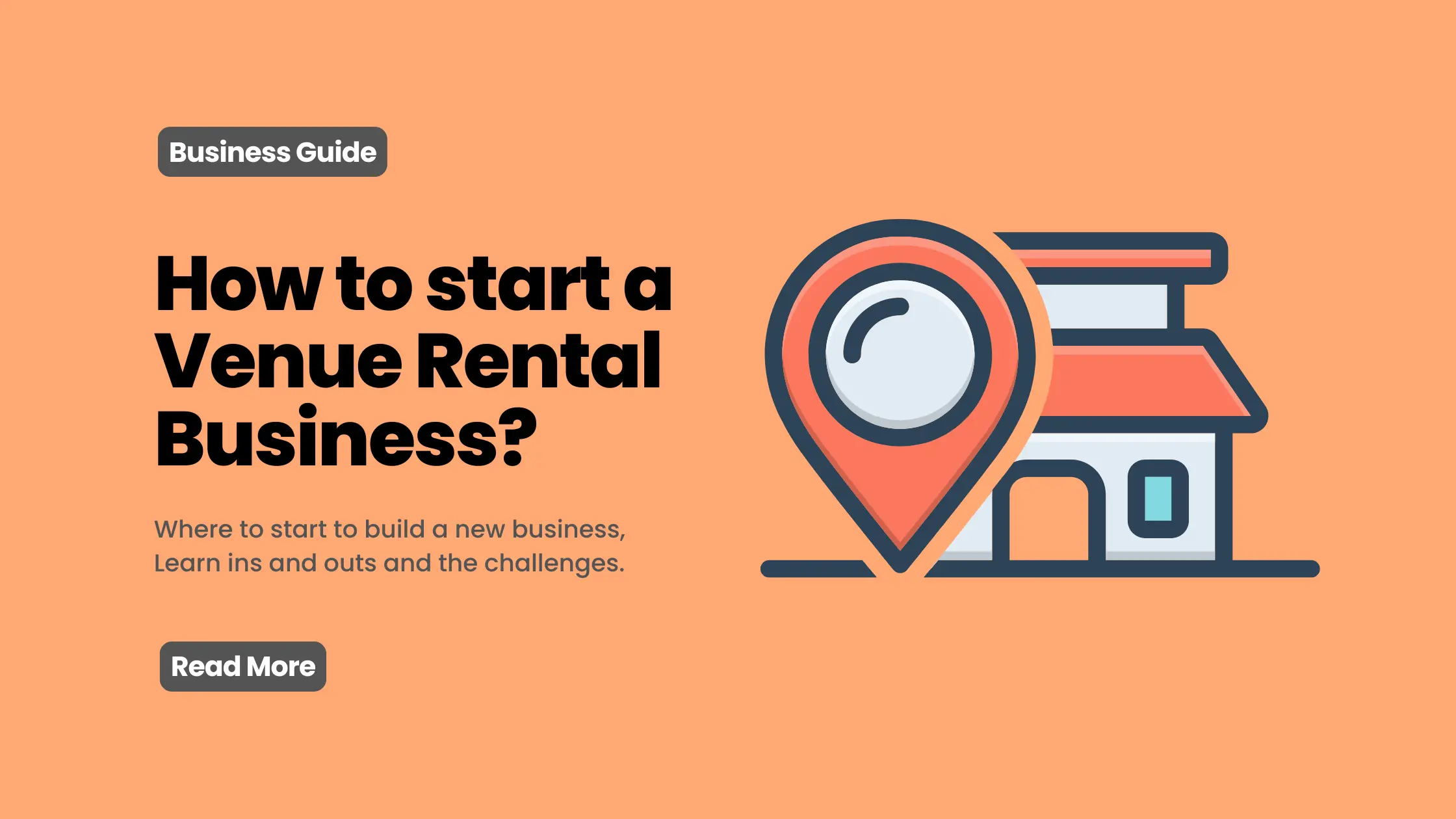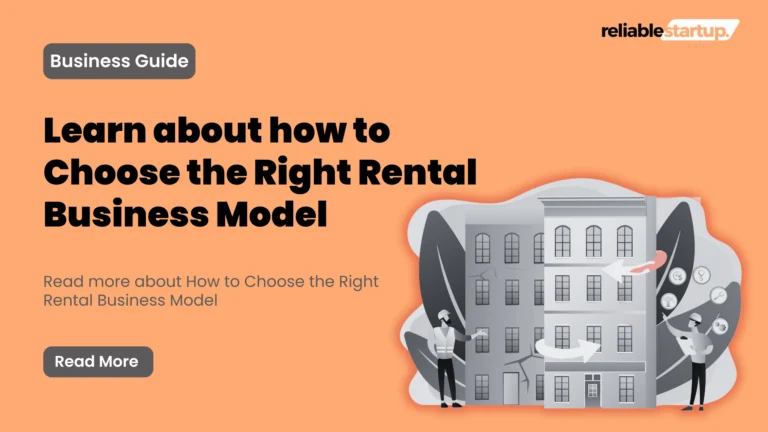How To Start A Venue Rental Business: Experts guide

A venue is a place where events or activities are held, such as concerts, weddings, conferences, or sports games. It can be any location designed or adapted for hosting gatherings, including halls, stadiums, parks, or theatres.
Starting an event venue rental business can be a highly profitable business, but for that you can research venue market with proper plan, and execute smartly. So if you do that you can enjoy great success very soon.
What is venue rental business?
An event venue business offers to rent out spaces for a variety of occasion and activities, such as weddings, conferences, parties, meetings, seminars and other social or professional convocations. This business model targets customers who are looking for a suitable location for their event. They provide the necessary equipment and sometimes additional services to ensure the success of the event.
Main Components of the Venue Rentals
These are the following main components that you will definitely consider before dig dipper into to the business:
1. Venue Types
a) Banquet Halls
For weddings help clients plan and coordinate their events, including layout design, scheduling, and vendor coordination., receptions and large gatherings or any indoor activity, banquet halls are best option.
b) Conference Centres
For corporate events, meetings, seminars or any professional convocation, conference centres are best option.
c) Outdoor Venues
For festivals, trade shows and outdoor weddings,Parks gardens and beaches are best option.
c) Special Venues
Unique locations with a special atmosphere such as historic buildings, museums, art galleries, barns and rooftops.
2. Services offered
a) Basic venue rental
The rooms are rented for a specific period of time and have many facilities like sitting, lighting and toilet.
b) Event planning
Help clients plan and coordinate their events, including layout design, scheduling, and vendor coordination.
c) Catering services
Provide food and beverage services in-house or through partnering with a catering company.
d) Equipment rental
Providing additional equipment such as audio equipment, displays, lighting, furniture and decoration.
e) On-site staff
Provide staff to assist with event setup, operations and cleanup.
3. Revenue Sources
a) Rental fees
Clients are typically charged a fee for using the venue based on the rental period and type of event.
b) Service fees
Wine and dine, full event planning, equipment rental and other services are available for an additional fee.
c) Packages and special offers
Attract customers by bundling venue rental with a range of services at a discounted rate.
4. Target Market
a) Business clients
The venue rentals Seek out companies which have a business to arrange conferences, meetings, and events, for corporate gatherings.
b) Personal Events
The venue rental business target personal events such as family get-togethers, weddings, and anniversaries.
c) Event Planners
This business target event planner as well ,the best Professionals arrange meetings for customers and find the best location.
d) Nonprofit organizations
Groups are looking for a place for fundraisers, social gatherings, and community events.
5. Marketing Strategy
a) Online Presence
A well-designed website that showcases the location, services offered, customer reviews and a simple application system.
b) Social Media
Be active on social platforms such as Instagram, Facebook, to display past events or previous projects, and promotional offers.
c) Networking
Build relationships with event planners, wedding coordinators and corporate clients,so they come again and enjoy your services and make your business grow.
d) Advertising
Use online ads, local ads, and banners to advertise your business and reach potential customers.
6. Operational Considerations
a) Location
Choose a location that is easy to reach and attractive to your market
b) customer service
Provide excellent customer service to ensure customer satisfaction and representative recommendations.
c) Maintenance
Perform regular maintenance to keep the venue attractive and functional.
d) Regulations and Approvals
Ensure compliance with local zoning laws, building codes, and event-related permits.
Now you know the all main components of venue rental business so lets kickstart your business and dive into this market and fulfil your dreams, here we provide you step-by step guidance to start your own business.
Take these steps before starting an Event Venue Business
Before starting a venue rental business, take these essential steps to ensure thorough preparation and success, Here’s a step-by-step list to follow before starting a this business:
1. Name your brand
A crucial first step in developing your brand identity is naming your event space company. First, check your business registry and trademark database to see if the name you desire is available. This will help you avoid legal problems. Additionally, verify that a proper domain is available to protect your online presence.
Pick a name that is straightforward, simple to spell, and easy to remember. Think about how the name conveys the unique features of the website and the mission of your business. A wise name choice can support your marketing initiatives and help your business stand out in the crowded market.
2. Create a business plan
Creating a business plan is the main key before starting venue rental business because it will help you to acknowledge the market or create a rough idea of your strategy, and provide a financial roadmap if necessary.
A brief summary of your entire plan, highlighting the most important aspects of your events business. Details about your business, including business history, the type of events you host (weddings, meetings, seminars etc.), and the type of venue (indoor outdoor venues).
Information about the events industry, including market size, trends, and growth potential based on research. Identify your direct and indirect competitors and prepare to achieve a competitive advantage.
3. Best legal structure for your business
Choosing the appropriate legal form for your event venue business is essential when getting started. In every state where you intend to conduct business, you must register your company and its name with the Secretary of State. The top five legal structures are as follows:
- Sole Proprietorship
- Collaboration
- Limited Liability company (LLC)
- C corporation
- S corporations
4. Additional rules and regulations
Once your business structure is decided and registered, the government will issue the official Articles of Incorporation. Additionally, you will also need these documents to open a business bank account.
NOTE: To determine the best legal compliance for your convention centre business, consult an attorney.
You can protect your own assets and ensure the success of your venue rentals by choosing the right legal compliance.
5. Get start-up funding for your venue rental business (if needed).
You may have decided that you need to raise capital to start a venue rentals. you know you’ll need funding to get your business off the ground. Here are some great sources of funding to consider:
i) Personal resources
Investing in your business using your own resources is an easy and quick way to get started.
ii) Loan from friends and family
Getting a loan from a friend or relative can make you feel comfortable and in good way. To avoid disputes, these arrangements should be handled professionally.
iii) Credit card loans
Although credit card loans have high interest rates, it can offer instant access to funds.This is good for temporary needs, when you are confident in your ability to pay off the loan quickly.
iv) Bank loans
Higher amounts of loan and regular payment plans are offered by traditional bank loans, but they usually need security and a perfect credit history.
6. Find a best location for your business
Every event venue company needs to pay attention to ensuring the safety of the venue. Find a catchy or unique location as it will attract more customers; however, remember that simple areas can be changed with little effort. Make sure that the room has enough space to accommodate the guests and all the facilities they need, such as parking space, kitchen and bathrooms.
If money is tight, consider some creative options like renting a warehouse or create something new by using DIY decor to attract customers.
7. Register your business
To start a venue rental business, you must obtain an Employer Identification Number (EIN). For this you must register your business with the IRS and IRS provides you EIN number. This number is necessary when opening a company bank account or hiring staff.
If you’re a sole proprietor without employees, you can usually use your Social Security number instead of an EIN, which gives your business added legitimacy and allows you to separate your personal and professional finances.
8. Licence and permits
It is critical to understand business licence and permit requirements if you want to operate your event venue legally. Apply for a general business licence in your own county or city first. Additionally, to ensure compliance with fire safety laws, obtain an occupancy permit from your local department.
If you have to supply wines based on what your customers require. You need to get a beer licence. Depending on the venue and activities, additional permits can be needed, such as noise permit for parties and a health permit for food service.
Make sure you get all the licenses and permits required to operate a business securely and lawfully. To improve the dependability and security of your business, find out the most recent guidelines and regulations from the local authorities.
Final Verdict
In conclusion, the venue rental business offers income and growth prospects and can be very profitable. A first-rate location, excellent customer service, and compliance with local laws are key to success. With proper planning and promotion, event venues can become popular venues for events and ensure long-term results.
Good luck!






